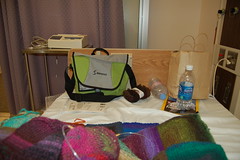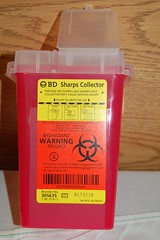Today's friendly visitor :)

A new study out is finding that childhood MS takes longer to develop disability in walking by 10 years over average aged (32) adult diagnosed MS. Very interesting. It'd be great if they could figure out why though! "When MS started in childhood, it took about 10 years longer to worsen to the point at which patients had trouble walking, the study shows. But childhood cases began nearly 20 years earlier than adult-onset cases. So even with the decade of delay in worsening symptoms, patients with childhood-onset MS were younger than adult patients when walking became difficult. "Patients with childhood-onset multiple sclerosis take longer to reach states of irreversible disability but do so at a younger age than patients with adult-onset multiple sclerosis," write the researchers. It's not clear why childhood-onset MS took longer to worsen to that point than adult-onset MS. About half of the children with MS took drugs that target the immune system, but "none of these drugs has a proven effect on the long-term development of disability," write the researchers."
Tovaxin keeps giving positive results from the lastest trials
I'm facinated by this therapy and where it will go... 92%reduction in relapses? Damn, thats a good number! "The one-year extension clinical trial enrolled 8 subjects. Tovaxin therapy achieved a 92% reduction in annualized relapse rate in patients who received two treatment doses of Tovaxin eight weeks apart and were monitored for an additional 44 weeks. Patients enrolled in the extension clinical trial were earlier treated with a T-cell vaccine developed from myelin basic protein reactive T-cells. The company noted that data from the extension trial indicates that subjects previously treated with T-cell vaccine can be safely and effectively retreated with Tovaxin. The Tovaxin Phase IIb clinical study known as TERMS will include 150 patients and will evaluate the efficacy, safety and tolerability of the Tovaxin T- cell vaccination with clinically isolated syndrome and relapsing-remitting multiple sclerosis patients. Opexa completed patient enrollment in the 52-week TERMS study on May 17, 2007. All patients who complete the TERMS trial will be eligible to participate in an optional one-year extension study.
Enrollment Begins For Study Of MBP8298 In Secondary-Progressive
I do believe there are some readers here who are interested in this potential drug... so here's some more news coming out about it. "Eligibility and Details: To enroll in this phase III study, people must be 18-65 years of age, with a documented history of secondary-progressive MS. Only people who are positive for the HLA DR2 and/or DR4 genes can participate; a blood test will be taken to determine HLA status. Participants must have had no relapse in the 3 months before the study. Participants will be randomly assigned to receive either 500 mg of MBP8298 or inactive placebo intravenously every six months for two years. The primary goal of the study is to determine the effectiveness of MBP8298 as measured by the EDSS, a widely used rating system of clinical status. Secondary objectives are to assess the drug's effects on disease activity observed on MRI (magnetic resonance imaging scans), relapse rates, quality of life and fatigue. Contact: For information on sites that are currently enrolling, please consult the study's listing on clinicaltrials.gov
TRIMESTA (oral estriol) potential oral med in trial
Did I read this right? This trial for an oral med is only for women with MS? Err... I think there's a gender missing in the MS population that might need a treatment option! Okay, so this is a drug already in use elasewhere in the world for menopause in women! No wonder men wouldn't be taking this drug... Anyways, they just got a $5 million grant from the NMSS and are recruiting. "TRIMESTA is an orally active, immunomodulatory and anti-inflammatory molecule the has been approved and marketed throughout Europe and Asia for approximately 40 years for the treatment of post-menopausal hot flashes, but has never been introduced in North America. Estriol, the active ingredient in TRIMESTA, is a weak estrogenic-based molecule that is produced in the placenta by women during pregnancy. Estriol is considered to play an important role in the immunologic privilege offered to the fetus during pregnancy and is also thought to be responsible for the spontaneous remission of Th1-mediated autoimmune diseases of women (such as multiple sclerosis and rheumatoid arthritis) during pregnancy, especially during the third trimester."
Tracing MS From Childhood to Adulthood
Wait for the rubbing alcohol to dry...
2007-06-10 15:27:21
Woohoo! I did my second Avonex (or not) injection today. So, it was a bit different sitting in my house alone with my needle posed and there wasen't a lovely encouraging nurse saying "just do it!". I tried really hard to not make today "needle day" but as I sat there with the needle about 2 inches above my thigh I really had to self talk myself into doing it. And this time, the needle stung a bit going in. But once I made the plunge (literally speaking), I just got it done. My hands didn't shake afterwards either this time so I guess I was a little more emotionally accepting of the whole process. Anyways, since starting this trial last week, I really don't feel any different. I had a couple fatigue days last week, but thats nothing new from time to time for me. I don't think I'm feeling any side effects from either potential drug I'm on. Weird feeling. Nice though.
2007-06-06 16:44:29

Here's the room I was in while having the blood pressure taken hourly. I had all my little time wasters around me :) And here is my brand spanking new sharpie box!

2007-06-05 13:21:29
I spent the day yesterday in the UBC hospital from 8:30 and finally released at 6PM. I took both my first doses of the trial medication which was all very interesting. I learned to inject myslef (!) and I actually did much better than I thought I would! My nurse was even telling everyone that I saw for other tests how shocked she was at how well I did :) Pretty happy about that. I was really shocked at how non-painful an intra-muscular injection was. I was totally expecting it to hurt big time and it just didn't. Crazy to have it all in my head about what it would be like only to be proven completely wrong. We'll see how I do at home next week doing it on my own without my nurse saying "just do it now, go ahead." :) I think it was "the other Heather" that sent me the butter analogy... the needle goes through your leg like a knife going into a pound of butter sitting on the counter. So true! My hands did start to shake once I was done the injection though. I didn't get the wash of fainting feeling, but I was a bit shaky for a few minutes afterwards. Phew! I can see a small poke hole in my leg from where I did the injection, but nothing else around it. no redness or tenderness.
Then I took the first dose of the oral med and had to stay in cardiology for 6 hours of observation. I was having blood pressure and all sorts of heart readings done hourly. This med can lower your heart rate when you take the first dose so they watch you really carefully. I'm not supposed to know if I'm on that drug though so I don't know what my readings were for the whole time. I do know that I had to be kept an extra hour and had to go walking and do some stairs to get my heart rate up some before being released. My heart rate was 66 in the morning and then I heard my nurse say to the doctor when she was going to release me that my heart rate had come up so I was clear to leave. Hmmm... so either I'm just really relaxed in the hospital environment or I'm on that med and it did what was expected.
It's an interesting head game now. I want to try to figure out what I'm on! hahaha. Bad. I shouldn't be doing that! I will find out in one year from today what I'm on. So, I'll just have to be patient! Beth - 51 injections to go! :)


